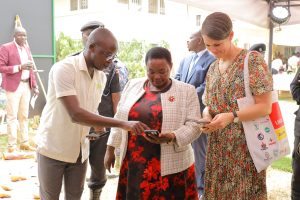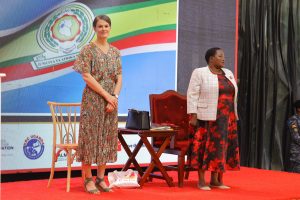By: Alinaitwe Jotham
KAMPALA
Prime Minister Robinah Nabbanja has officially launched the Uganda Refugee Resilience Initiative (URRI), a groundbreaking initiative funded by Denmark, worth a staggering Shs 145 billion (USD 40 million). This program, running from September 2024 to December 2028, is designed to enhance climate resilience and promote sustainable development for refugees and host communities across Uganda.

The Prime Minister, Robinah Nabbanja, signing the commitment pledge on behalf of the Government
With Uganda hosting the largest refugee population in Africa—over 1.8 million refugees—the initiative aims to address the mounting challenges posed by both the refugee influx and climate change. URRI will tackle these challenges by introducing climate-smart agriculture training, promoting the sustainable management of natural resources, and bolstering gender equality, women’s rights, and empowerment in both agricultural practices and climate change adaptation.
The program will primarily focus on Uganda’s West Nile region, covering Districts such as Madi-Okollo, Terego, Koboko, Yumbe, Obongi, and Moyo, where the Danish Refugee Council will lead its implementation. In addition, Northern and Western Uganda will also benefit from the program, including the Districts of Adjumani, Lamwo, and Kyegegwa, with Save the Children leading the charge in these areas.

Rt. Hon. Prime Minister Robinah Nabbanja (centre) inspecting the exhibition sits and guided by H.E. Signe WInding Albjerg Danish Ambassador (right) to Uganda
Key Components of the URRI program include Climate-smart agriculture training, Financial inclusion initiatives, post-harvest handling, and Value-addition training. It will also offer support for alternative sustainable livelihoods, energy-saving technologies, leadership training for women and adolescent girls, and the cultivation of multi-purpose trees to benefit households and communities.
The growing refugee population, along with the escalating impacts of climate change, has intensified the strain on local resources. Refugee-affected areas are grappling with environmental degradation, exhausted natural resources, and depleted ecosystems, all of which threaten agriculture—the cornerstone of livelihoods for many refugees and host communities. Women and children, who make up the majority of the refugee population, are particularly vulnerable to these challenges.
The Danish Ambassador to Uganda, Signe Winding Albjerg, highlighted the importance of the initiative, stating, “Through URRI, we commit to addressing the pressing needs of both refugees and host communities while upholding Uganda’s progressive refugee policy. Denmark’s role in this effort speaks to the strong, historic, and deeply rooted partnership between our nations over the past three decades.”

Prime Minister Robinah Nabbanja (right) poses for with H.E. Signe WInding Albjerg (left) the Danish Ambassador to Uganda
As the refugee population continues to grow, Uganda faces challenges related to increasing demand for land and resources. Climate change, marked by unpredictable weather patterns, droughts, and floods, is further intensifying competition for water, fertile land, and other vital resources. Women, particularly those in refugee and host communities, bear the brunt of these disruptions as primary caregivers, making it essential for solutions to be both comprehensive and inclusive.
Prime Minister Nabbanja emphasized Uganda’s unique approach to refugee management, stating, “We do not place refugees in camps; instead, we give them land, access to services, and opportunities to contribute to the economy. However, the challenges of climate change, food insecurity, and limited resources require us to work even harder to support both refugees and host communities.”
With the commitment to ensuring that the resources allocated to URRI are used transparently and effectively, Nabbanja noted that the government would prioritize tangible outcomes that directly improve the lives of refugees and host communities, ensuring that funds reach those who need them most.
The Uganda Refugee Resilience Initiative is a bold step towards creating a more resilient and self-reliant future for Uganda’s refugees and their host communities. By empowering these communities with the tools and knowledge to adapt to a changing climate, URRI hopes to make a lasting impact on both local and global sustainability efforts.
END






